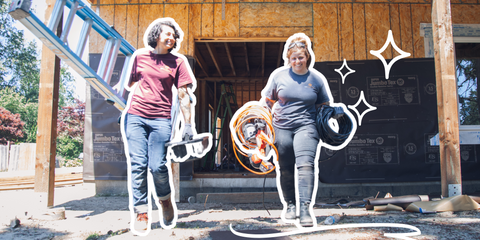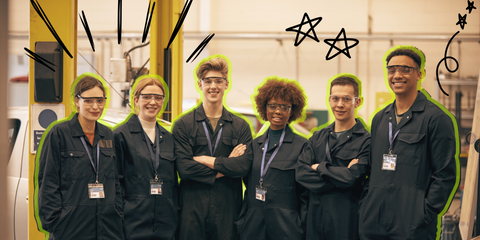Want to become a roofer? Whether you're still in school or switching careers, the path is simpler than you might expect.
The career pathway to becoming a roofer is easy to start. This guide will walk you through every step, from your first math class to earning your journeyman license, and provide answers to the most common questions about this challenging yet well-paid trade.
What is the career path for a roofer?
-
High School Diploma or GED
Some background in construction or hands-on classes helps.
-
Pre-Apprenticeship (Optional)
Short-term training programs (like those from the Arizona Roofing Contractors Association (ARCA)) teach the basics and connect you to employers.
-
Apprenticeship (3-4 years)
Get paid to work with experienced roofers while completing classroom training on tools, materials, and safety.
-
Journeyman Roofer
After your apprenticeship, you can take the licensing exam and start leading jobs on your own.
-
Supervisor or Business Owner (Optional)
With experience, you can lead a crew or apply for a contractor license to start your own company.
-
Keep Learning
Roofing technology, materials, and safety standards keep changing. Stay sharp with ongoing training.
Trade school is a great way to start your journey as a roofer. While it requires an investment, it’s much more affordable than traditional college tuition. Plus, it provides valuable connections to apprenticeship programs, giving you an edge in the field. That said, there are other ways to secure an apprenticeship. Learn more about the various pathways to becoming an apprentice in the trades: How to Become an Apprentice.
FAQs
It’s important to have the facts first before choosing a career path. Here are the answers to the most common frequently asked questions regarding how to become a roofer.
How many years does it take to become a roofer?
The career path for a roofer typically takes 4-5 years as an apprentice. The best part is that you get paid to learn on the job. After the apprenticeship, you have the opportunity to take the licensing exam and become a Journeyman roofer, which has higher pay.
Can roofers make $100,000 a year?
Yes, if you work your way up to a supervisor or manager position, you can earn six figures in the roofing industry. Location, company, and the demand for work make the earning potential variable, but yes, it is common for roofing supervisors and project managers to earn a salary over $100,000 a year.
Why are roofers paid so much?
Jobs that involve clear risks, like roofing, typically offer higher pay. Skilled labor doesn’t come cheap, and not everyone can handle the job, especially when it means working at significant heights. If you're afraid of heights, roofing probably isn’t the right career for you. And that’s why people will shell out the big bucks for roofers, everyone needs a roof, but not just anyone can do the job right.
What is the fastest way you can become a roofer?
You need to work as an apprentice for 4 to 5 years to become a roofer. There are no shortcuts. But the good news is that as an apprentice, you get paid for your work. There is no need for a shortcut because you will be earning an income immediately.
Are roofers still in demand?
Yes. The Bureau of Labor Statistics predicts the need for roofers to grow by 6 percent by the year 2033. There is no shortage of roofs that need to be repaired and new construction in need of roofing.
Is it too late to become a roofer in your 30s or 40s?
If you’re in good physical shape, you can become a roofer at any age. There’s no age limit on apprenticeships, but physical ability is essential. If you’re not in the best shape but are interested in roofing, there are other ways to make a career in this industry. You could become a roof designer or work in sales for roofing materials.
Will roofers be replaced by AI?
No. We will see AI automate some office tasks related to running a roofing business, and new tools and gear are likely to be enhanced with AI technology. But human roofers are necessary and won’t be put out of a job by artificial intelligence technology. However, robots capable of laying shingles do exist, but they are a long way from being used on real jobsites. Even once they are introduced onto the market, they cannot handle the complications that inevitably come up with real-world roofing projects. Robots might eventually reduce the size of a roofing team, but experienced roofers will always be necessary to manage the roofing project. So if you’re entering the roofing trade, in the future, you may need to learn some robotics. Now is a good time to enter the trade and gain the experience necessary to secure your job in a leadership role to hedge your bets against shingle-laying robots in the future.
Is being a roofer a hard career?
Yes. It is a very physically demanding job. On the plus side, roofers get plenty of exercise, outdoor air, and sunlight. Though as you progress through the ranks to supervisor or manager, you may be able to reduce your physical responsibilities and take on more leadership and business tasks. There are ways to adapt your career through the decades.
Ready to get started?
Explore our Resource Hub to find pre-apprenticeship programs, training opportunities, and career tools to help you take the next step.







